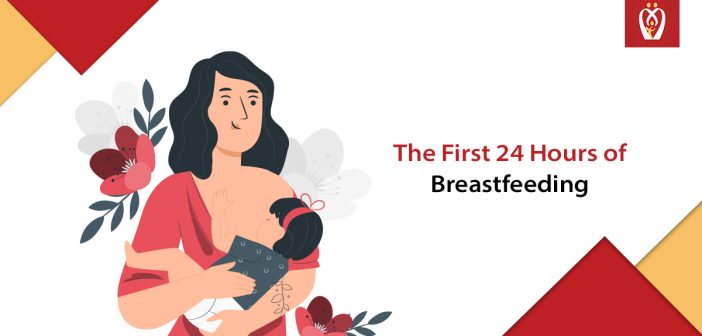The first 24 hours of Breastfeeding with your infant are both exhilarating and terrifying, especially if you’ve never nursed before. To help you get off to the best possible start, we wanted to guide you through what nursing may feel like .
Life after giving birth might be perplexing because you’re trying to get to know your new baby while healing from the delivery. Your emotions may be all over the place (particularly between days two and five, when many women experience both the ‘coming in’ of their milk and the ‘baby blues’). Furthermore, there is often an expectation – and pressure – to be up and about soon and to be a supermom in general. However, with your kid and getting back on track with breastfeeding is one of the most beneficial things you can do this week.
The first 24 hours of your baby’s life are critical for both you and your kid to have a successful nursing experience. Putting your new-born to the breast as soon as possible after delivery, whether vaginally or by C-section. It’s critical to get off to a strong start.

What to expect during the first 24 hours of breastfeeding is outlined below.
The Initial Hours
For the first two hours after birth, new-borns are usually awake and attentive, and they’re usually anxious to eat. Therefore, nursing is commonly recommended within the first hour (“the golden hour”).
Latching on to your infant shortly after delivery might indeed be difficult. For example, if you have your baby at the hospital, you might have a blood pressure cuff on one arm, an IV in the other, and the baby swaddled in several blankets. Sheesh, writing that sounded overwhelming – kudos to you for living through it. If you’re having difficulty, ask for your help. Some midwives and nurses may have trained as licenced lactation consultants, so they’ve seen everything.
Breastfeeding and placing your infant may not feel natural or comfortable right after they are born. However, do your best and remember that everything will change once you’re out of the delivery room.
Getting a Sleepy Baby to Wake Up
While infants are awake and alert for the first two hours of their lives, they grow tired between the hours of two and twenty-four hours. Baby (and you!) are likely to be exhausted, depending on the length of your labour and the style of delivery you experienced. If the baby is not waking up on his own, it is vital to rouse him to breastfeed during this stage to establish your milk supply and the infant’s nutrition.
Getting Your Milk Supply Started
Place your infant on your breast as often as possible to stimulate your breasts and breast milk production. If your infant is extremely tired and isn’t breastfeeding effectively or frequently, you can begin to mimic what the baby would do if he were breastfeeding more actively.
Breast stimulation aids in the development of your milk production.
Pumping within the first 24 hours postpartum is not suggested. However, exceptions are true for women who have to pump when their babies are born premature, born with medical difficulties, and situations where mother and baby must be separated.
Common Problems
Sore nipples are the most prevalent problem that breastfeeding women suffer in the first 24 hours. A bad nursing latch is a common source of discomfort. The nipples may be sensitive even when the baby is latching on appropriately. Since their nipples are at such a high level of sensitivity, mothers often jump when their infant latches on. When the infant is latching on well and the sensitivity lessens, the nipple pain should disappear.
In the first 24 hours after a c-section, mothers face additional hurdles. The pain from the procedure can make positioning the infant and breastfeeding difficult. Pain medication and positioning assistance from a nurse or lactation consultant can make the process go much more smoothly.
Is there enough breast milk for my baby?
You may be concerned that your infant will be hungry because you only make modest amounts of milk at first. If you’re feeding on demand, though, you should be able to meet your baby’s needs. Check the number of dirty and wet nappies he’s creating, to maintain track.
The first three or four weeks of a baby’s life are spent feeding and sleeping. Consider seeing a healthcare professional if your kid isn’t settled and wants to feed all the time.
After a meal, your infant may vomit up milk-coloured vomit, which isn’t a cause for concern.
However, in the following cases you should seek medical attention if your baby has
- Vomit that is orange, red, green, brown, black, or has projectile vomiting.
- a fever
- blood in his poop,
- a sunken fontanelle (a temperate region on his head),
- or is not back to his birth weight by two weeks of age
In all possibilities, he doesn’t show any of these symptoms and is still growing. Then, breastfeeding will become second nature to you both, and you’ll fall into a more regular schedule.
First-Hand Advice for the First 24 Hours
Breastfeeding goes quickly for some women and babies right away. Others require a little more patience and assistance to get things underway. Here are some suggestions for the first 24 hours of nursing
- Breastfeed your kid within the first hour of his or her birth –Your infant is more likely to take the breast if he or she is awake.
- Be persistent and consistent in your efforts. Take what your baby gives you and watch what occurs at the next feeding, even if she doesn’t amaze you with a full feeding straight immediately.
- Spend time with your newborn in direct skin-to-skin contact to urge your baby to breastfeed more.
- Avoid using a pacifier with your child. You can place your baby to the breast instead if she is crying or appears to be interested in sucking.
- If your baby is sleeping, keep putting them to the breast every few hours, even if you have to wake them up. Remember that as the days pass, newborns become much more awake and breastfeed a lot better.
- If you’re concerned that your kid isn’t getting enough to eat on the first day, speak with your nurse or a lactation consultant.
- In the first few days of nursing, your colostrum is all your baby needs, and it gradually increases until your breasts are full of milk by the third day postpartum. So, even if it appears that your child requires more, extra formula feedings are not required until medically necessary.
Download the Nurturey PinkBook app, the smartest improvement to the NHS paper red book, for more tips and techniques on preparing for delivery and early life.






